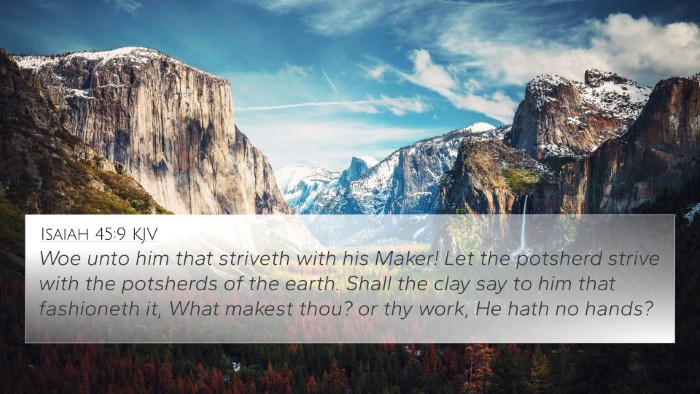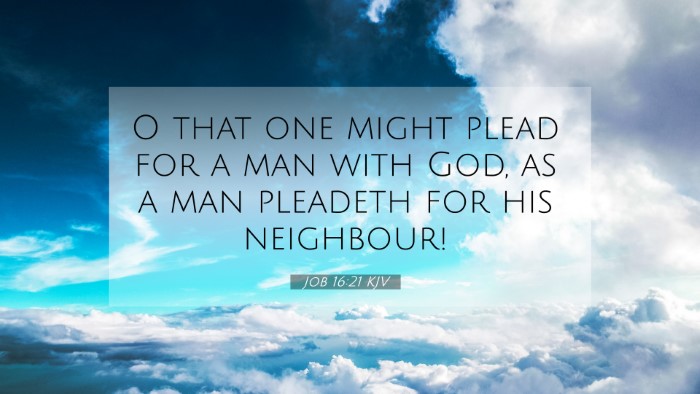Old Testament
Genesis Exodus Leviticus Numbers Deuteronomy Joshua Judges Ruth 1 Samuel 2 Samuel 1 Kings 2 Kings 1 Chronicles 2 Chronicles Ezra Nehemiah Esther Job Psalms Proverbs Ecclesiastes Song of Solomon Isaiah Jeremiah Lamentations Ezekiel Daniel Hosea Joel Amos Obadiah Jonah Micah Nahum Habakkuk Zephaniah Haggai Zechariah MalachiJob 16:21 Similar Verses
Job 16:21 Cross References
O that one might plead for a man with God, as a man pleadeth for his neighbour!
Uncover the Rich Themes and Topics of This Bible Verse
Listed below are the Bible themes associated with Job 16:21. We invite you to explore each theme to gain deeper insights into the Scriptures.
Job 16:21 Cross Reference Verses
This section features a detailed cross-reference designed to enrich your understanding of the Scriptures. Below, you will find carefully selected verses that echo the themes and teachings related to Job 16:21 KJV. Click on any image to explore detailed analyses of related Bible verses and uncover deeper theological insights.

Ecclesiastes 6:10 (KJV) »
That which hath been is named already, and it is known that it is man: neither may he contend with him that is mightier than he.

Isaiah 45:9 (KJV) »
Woe unto him that striveth with his Maker! Let the potsherd strive with the potsherds of the earth. Shall the clay say to him that fashioneth it, What makest thou? or thy work, He hath no hands?

Romans 9:20 (KJV) »
Nay but, O man, who art thou that repliest against God? Shall the thing formed say to him that formed it, Why hast thou made me thus?

Job 31:35 (KJV) »
Oh that one would hear me! behold, my desire is, that the Almighty would answer me, and that mine adversary had written a book.
Job 16:21 Verse Analysis and Similar Verses
Understanding Job 16:21
Job 16:21 is a poignant expression within the Book of Job, capturing the essence of Job's plea to God for understanding amidst his suffering. This verse reflects Job's desire for advocacy in the heavenly court, as he seeks to make his case before God. Through the lens of several public domain commentaries, we explore the deeper meanings and connections of this scripture.
Verse Context
Job 16:21 states: "Oh, that a man might plead with God, as a man pleads for his neighbor!" Here, Job laments his state, intensified by the inattention he feels from God amid his deep personal suffering.
Summarized Insights
- Matthew Henry: Henry emphasizes the importance of having an advocate and the human need for intercession, drawing parallels to Christ's role as mediator.
- Albert Barnes: Barnes highlights the desperation in Job's words, indicating how Job seeks someone who can bridge the communication gap between humanity and divinity.
- Adam Clarke: Clarke notes that Job yearns for justice and understanding, reflecting the inner turmoil that arises when individuals face suffering without apparent reason.
Diving Deeper: Thematic Connections
The themes found in Job 16:21 resonate throughout the Bible, showcasing the fundamental human need for understanding and representation in our relationship with God. Here are the connections across scripture:
Cross References and Related Verses
- Job 9:33: “If only there were someone to mediate between us, someone to bring us together.” - Emphasizes the need for an intermediary between God and man.
- 1 Timothy 2:5: “For there is one God and one mediator between God and mankind, the man Christ Jesus.” - Points to the New Testament fulfillment of the need expressed by Job.
- Psalms 27:9: “Do not hide your face from me; do not turn your servant away in anger; you have been my helper. Do not reject me or forsake me, God my Savior.” - A plea for God’s presence and advocacy.
- Hebrews 7:25: “Therefore he is able to save completely those who come to God through him, because he always lives to intercede for them.” - This reflects the role of Christ as a perpetual advocate.
- Exodus 32:11-14: Moses pleads with God on behalf of the Israelites, showcasing an instance of human intercession before God.
- Romans 8:34: “Who then is the one who condemns? No one. Christ Jesus who died—more than that, who was raised to life—is at the right hand of God and is also interceding for us.” - Affirms Christ’s mediatorial role.
- Job 33:23-24: Speaks of a messenger who explains God’s intentions, emphasizing the critical role of understanding divine intentions.
- Job 31:35: Job expresses a longing for a hearing, indicating his deep need for communication with God.
- Isaiah 53:12: “He bore the sin of many, and made intercession for the transgressors.” - Reflects the concept of intercession associated with suffering.
- James 5:16: “The prayer of a righteous person is powerful and effective.” - Highlights the power of intercessory prayer.
Applying the Insights
In studying Job 16:21 and its connections, several key applications arise:
- Mediation in Suffering: Understanding that we can seek out Christ as our mediator gives us hope during trials.
- The Importance of Prayer: Our prayers can serve as intercessions, showing our reliance on God in times of need.
- Building Connection Through Scripture: Engaging with cross-references helps to see the continuity of God’s character and purpose across the Bible.
- Encouragement in Despair: Job's struggle resonates with many, reminding us that our cries for help are not unheard.
Tools for Bible Cross-Referencing
The exploration of Job 16:21 can be further enriched through various tools designed for cross-referencing:
- Bible Concordance: A resource that can assist in finding related verses and themes.
- Bible Cross-Reference Guide: Helps in discovering thematic connections and pairs within scripture.
- Cross-Reference Bible Study: A methodical approach in studying teachings and correlating messages in different books of the Bible.
- Comprehensive Bible Cross-Reference Materials: Various study aids that provide detailed connections between verses.
- Bible Chain References: Techniques that enable a reader to follow thematic links from one verse to another.
Conclusion
Job 16:21 is a significant verse that highlights the human need for mediation and understanding in the face of suffering. By examining it alongside various related scriptures, we uncover deeper connections within the Biblical narrative that speak to God's willingness to hear our pleas and the roles that mediators play in this relationship. Ultimately, Job's cry resonates with the believers’ hope in Christ, affirming that we have a mediator who intercedes for us, as indicated in both the Old and New Testament.







